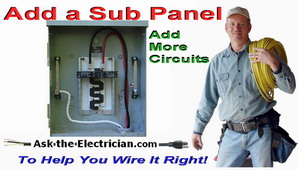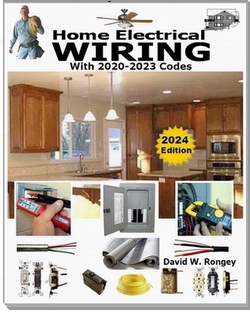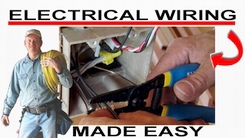Installing a Workshop Circuit
|
Summary:
What Wire Size should I use for a Workshop Circuit?
© By: Dave Rongey |
Wire Size for a Workshop Circuit
Electrical Wiring Video
How to Install and Wire a Sub Panel
CLICK THE IMAGE OR THE LINK BELOW TO PLAY THIS YOUTUBE VIDEO

How to Install and Wire a Sub Panel
Click Here to Play my Electrical Wiring Videos
Be Sure to Subscribe to my YouTube Channel, Thank You!
Electrical Question:
What Wire Size should I use for a Workshop Circuit?
- I'm installing a #4 wire for the circuit to my workshop.
- The workshop is about 100 feet away from the house.
- I'm planning on using #8 solid copper for my ground wire.
- Does that sound correct for the ground wire size?
Thanks-
Dexter W.Copper Ground Wire for a Workshop Circuit
Electrical Question Answer: Hi Dexter - Great Electrical Repair Question!
Workshop Sub-Panel
NOTE: This workshop will have a sub-panel installed as described below:
- The #8 Copper ground wire for your workshop circuit should be fine.
- I would suggest that you bring your #4 wires into a small sub-panel, preferably through a main breaker disconnect.
- Make certain that you are bonding your grounds separately from the neutral because this will be a panel being served from away from your main service.
- I suggest installing GFCI protection for your receptacle circuits in the workshop environment.
More about Electrical Sub-Panels
Follow up from: Dexter:
Thanks Dave!
I actually got with a local Electrician to do the workshop.
I'm into Electronics Engineering but Electrical is a little different and I couldn't remember the rule of thumb for ground wires.
Thanks again, you offer a great service.
Dexter W.














